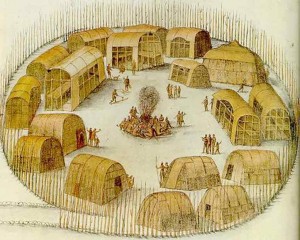Europe held indisputable interest in expansion and exploration of new land for many various reasons. Early on it was for the trade of riches, sugars, spices and silks. Also new routes to lead to these trades, but alternate routes were needed to overcome monopolies. Plus new land for expanding territory, and empire in a new kingdom meant more overall land, and more land was in essence equal to power. With advances in technology throughout this long era of exploration and settlement the quest for these things became easier as time went on. Colonization was lead by Spain and Portugal, in search of riches and trade routes primarily. It was then followed by England and French and many others who left for various reasons. It’s these reasons that will be discussed. These three key developments of religion, politics and economics lead to a surge in colonization and expansion in North America and settlements altogether.
The idea of coming to an untamed land, where rules and regulations are non existent motivated and inspired people of England and bordering nations to take the harsh voyage to the new land in hopes of developing a better faith. With the reforms of John Calvin, the Puritans grew tired of the incomplete reformation of the English Church. From here many migrated to North America, where they hoped to conclude such a reformation. The Puritans were motivated by what they thought the Church of England was failing at. They voiced discontent with the corrupted practices from Rome, and thought that they should all together abolish bishops. This caused the Puritans to leave, and create a pure state. This led to Pilgrims and other Puritan like groups to leave to in hopes for reformation elsewhere. This effected there willingness to leave for hopes that religion would be truer to what they hoped in England and they left with inspiration for the new world.
People that were oppressed in England, losing jobs, homes, and money to taxes and other reforms from government types, were in search of a way to gain land, or homes. This search brought them to America. Much like the Pilgrims who left in quest of religious freedom from England, many people left in hopes of discovering new land. With tons of untamed land waiting for people, it was easy to come join colonies and gain land. In the colonies they exercised the new land by cultivating it much more than possible in England. They used the natural resources depending on where they settled, and depending on the land, they sent exports and made money and word came back to England, and this led to economic opportunity for the people who wanted to travel and do the work.
The need for job’s demanded people for work, and guaranteed them with pay. With the joint stock company, and the Virginia Company and others like that, the Europeans who came here in search of land for homes and a new start, in essence got what they needed. The new colonies flourished with the trade and exports and imports. The people in England needed imports from the colonies, and lots of them. The colonies put out many exports, and expanded their resources and economy. The economic value of land was vastly important. If a colony settled on fertile land, and was able to produce cash crops from it, the money could be rewarding for everyone who worked the land. This gave all a chance, and required no skill, except manual hard labor. This was inspiring to many and made them flock for land and a new economic opportunity.
It is these three key traits that caused a migration from Europe and in particular to North America and to New England. Although there are many others, it seems that these three of religious freedom, land, and economic opportunity it possessed the most weight for causing people to come to the new land. Over a widespread time many people came over and settled down in New England and the south to start a new lifestyle.

it was pretty helpful
thanks!
it was okay
So much more concise than my textbook! Thanks!
cool, thanks!